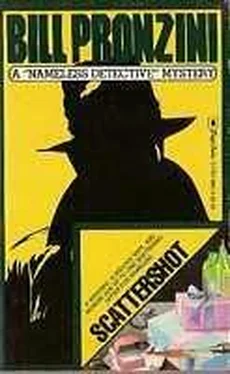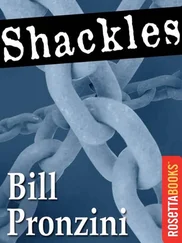Bill Pronzini - Scattershot
Здесь есть возможность читать онлайн «Bill Pronzini - Scattershot» весь текст электронной книги совершенно бесплатно (целиком полную версию без сокращений). В некоторых случаях можно слушать аудио, скачать через торрент в формате fb2 и присутствует краткое содержание. Год выпуска: 0100, Жанр: Криминальный детектив, на английском языке. Описание произведения, (предисловие) а так же отзывы посетителей доступны на портале библиотеки ЛибКат.
- Название:Scattershot
- Автор:
- Жанр:
- Год:0100
- ISBN:нет данных
- Рейтинг книги:5 / 5. Голосов: 1
-
Избранное:Добавить в избранное
- Отзывы:
-
Ваша оценка:
- 100
- 1
- 2
- 3
- 4
- 5
Scattershot: краткое содержание, описание и аннотация
Предлагаем к чтению аннотацию, описание, краткое содержание или предисловие (зависит от того, что написал сам автор книги «Scattershot»). Если вы не нашли необходимую информацию о книге — напишите в комментариях, мы постараемся отыскать её.
Scattershot — читать онлайн бесплатно полную книгу (весь текст) целиком
Ниже представлен текст книги, разбитый по страницам. Система сохранения места последней прочитанной страницы, позволяет с удобством читать онлайн бесплатно книгу «Scattershot», без необходимости каждый раз заново искать на чём Вы остановились. Поставьте закладку, и сможете в любой момент перейти на страницу, на которой закончили чтение.
Интервал:
Закладка:
“I’m not relentless.”
“But you are. It’s a kind of macho thing.”
“Macho? Me?”
“You have a certain dominant-male attitude, yes. You’ve got to have things your way; otherwise they’re just no good for you.”
I put my fork down-harder than I’d intended, because a couple at the next table glanced over at us. “That’s not true,” I said.
““You meet a woman, decide she’s what you want, and a few days later you’re pressing for marriage. That’s machismo. You don’t seem to care what I want.”
“I thought you wanted me.”
“How could you think that? You don’t know who I am; you don’t know me any better than I know you. All you know is that I’m the daughter of two pulp writers. And you love the pulps, and boy, wouldn’t it be great to wrap up all your passions in one neat little package.”
“That’s a lot of crap,” I said.
“Is it? What attracted you to me in the first place?”
“You attracted me. You.”
“Not my background? Not the fact that we met at a pulp convention?”
“Listen, you were the one who came on to me, remember? How come? Your mother wrote private eye stories; you told me you’d been fascinated by private eyes ever since you were a kid. So what attracted you to me, huh?”
“I don’t deny it was your profession.”
“Well, then?”
“But I don’t get off on the idea of spending the rest of my life with a notorious private eye. It’s not that important to me, not in the long run where it counts.”
“Are you saying I do get off on your background?”
“I don’t know,” she said. “I’m just trying to understand who you are, why you want me so much. I’m just trying to make up my mind what kind of future we’d have together.”
“It sounds to me like you’ve already made up your mind.”
“There you go with that macho stuff again. Why do you always have to jump to conclusions when things don’t suit your way of thinking?”
I couldn’t think of anything to say; words splut tered in my head like a lot of faulty Roman candles. People were looking at us; we’d been talking in louder tones than either of us had realized. The anger we’d been building up lay as heavy as smoke in the air between us, and we both seemed to become aware of it at the same time. Kerry averted her eyes, put them on her salad bowl. I picked up my fork again and sat there holding it trident-fashion, like a pathetic Neptune.
“I don’t want to fight,” she said in a low voice. “Please, let’s just drop it.”
“All right. Consider it dropped.”
We finished eating in silence, Kerry picking at her food, me compulsively wolfing bread and salad and beer. I made a couple of overtures at small talk over coffee, but it was no good; she had her thoughts and I had mine, and we had stopped communicating for the time being. Maybe for good, I thought. I felt low and helpless and confused; I felt lousier than I had in the Hall of Justice, or at any time during this whole miserable week.
We said exactly ten words to each other on the ride up to Diamond Heights. “Do you want me to put on the heater?” I said, and she said, “Yes,” and that was it. When we got to her building I walked with her to the door. Fog eddied around us, turning the street lamps and apartment lights into fuzzy smears in the darkness. It was damned cold, but no colder than it had grown between us.
I said, “I don’t suppose I get to come in.”
“I’d rather you didn’t tonight.”
“Or any other night?”
Silence. She was rummaging in her purse for her key.
“I’ll be over in Ross most of tomorrow,” I said. “The wedding-presents thing. But we can do something on Sunday-even go jogging again if you want.”
“I don’t think so. I’ll be busy on Sunday.”
“Doing what?”
“That’s my business, isn’t it?”
“Another date with Jim Carpenter?”
It just came out; I hadn’t planned to say it. But she didn’t respond. She just bent over and keyed open the door.
“Kerry, look, I’m sorry. …”
“So am I,” she said. She straightened and kissed me on the cheek, sisterlike; her lips were very cold. “Take care tomorrow. Don’t get into any more trouble.”
“I won’t. I’ll call you, okay?”
“Good night,” she said, and in she went, and the door clicked shut behind her.
I stood there for thirty seconds or so, shivering in the chill fog. Then I tucked my tail between my legs and went home to sleep in my lonely bed.
I was up at seven on Saturday morning, prowling around my flat like a caged bear. I still had a compulsive need for food; I ate two pastrami sandwiches, some leftover Kentucky Fried Chicken, an apple, and washed it all down with a quart of milk. When I was done I felt greasy and bloated and mean. If anybody had come around just then I would have jumped all over him, growling and biting.
Last night’s restaurant scene kept replaying in my mind. None of what Kerry had said to me was true; I’d been through that particular psychoanalytical trip myself, not long after I met her, and I had rejected the implications. The pulps had been a central part of my life for three and a half decades, yes; I had always tried to emulate the pulp detectives I admired, yes. But I did not allow them to govern my emotions. I did not love Kerry because of her connection to those yellowing old magazines and the people who had written for them.
The macho thing-that was crap, too. I didn’t need to have things my way in order to be happy; I did care about Kerry and her feelings and what she needed. I loved her, that was all. I wanted her, wanted the commitment, wanted a life together. It was true that I didn’t know her and she didn’t know me; but we were learning. That was what love was all about, wasn’t it? Learning about each other, unveiling secrets, taking the good with the bad-cementing the bond. No one could ever really know another person, no matter how close you became or how long you were together. All you could do was learn as much as possible. And keep on learning.
I should have said all that to her last night, I thought, instead of getting upset and defensive. Then I thought: Tell her now. Call her and tell her, clear the air.
So I went to the phone and dialed her number- but she wasn’t home. Eleven rings, no answer. Eight-fifteen on a Saturday morning and she was already gone. Out jogging, probably; she was as compulsive about jogging as I could be about eating. Or maybe she was out with-
No. Forget that. Forget Jim Carpenter. He isn’t going to come between you and Kerry; the only one who’s doing that is you, smart guy.
I rang up the Hall of Justice to find out if Carolyn Weeks and/or the missing Hornback money had been located. They hadn’t. Neither Klein nor Eberhardt was in, but Klein’s partner, Jack Logan, was there, and he filled me in. Weeks’s car had been found abandoned in the Sunset District; a lab check on it had turned up traces of blood on the front seat that matched Hornback’s AO type, which added weight to the case against her. They figured she had picked up the money at a neighborhood bank in the Sunset area-a check of the city banks had uncovered a safe deposit box in her name at a B of A branch on Noriega-and then taken public transportation. Whatever else she was, she was also fairly cunning. Either she was holed up someplace in the city or she had managed to elude police surveillance at the bus depot, the Southern Pacific commuter station, or the airport. She could even have picked up one of the Golden Gate Transit buses that serviced Marin and Sonoma counties to the north; they made street stops at several points within the city, before heading out of it across the Golden Gate Bridge.
Читать дальшеИнтервал:
Закладка:
Похожие книги на «Scattershot»
Представляем Вашему вниманию похожие книги на «Scattershot» списком для выбора. Мы отобрали схожую по названию и смыслу литературу в надежде предоставить читателям больше вариантов отыскать новые, интересные, ещё непрочитанные произведения.
Обсуждение, отзывы о книге «Scattershot» и просто собственные мнения читателей. Оставьте ваши комментарии, напишите, что Вы думаете о произведении, его смысле или главных героях. Укажите что конкретно понравилось, а что нет, и почему Вы так считаете.












